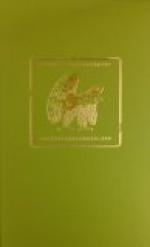She turned to give him her rare, grave look, and instantly his eyes telegraphed appreciation. Then he remembered. The swift revulsion came over him. He swung on his heel to go back to his chair, and the unexpected movement brought him in conjunction with the punch tray. The boy righted it dexterously, and she took the offered glass and settled again in her seat. But from his place across the deck, Tisdale noticed a drop had fallen, spreading, above the hem of her white skirt. The red stain held his austere gaze. It became a symbol of blood; on the garment of the vestal the defilement of sacrifice.
She was responsible for Weatherbee’s death. He must not forget that. And he saw through her. Now he saw. Had she not known at the beginning he was an out-of-doors man? That he lived his best in the high spaces close to Nature’s heart? And so determined to win him in this way? She had meant to win him. Even yet, she could not trust alone to his desire to see David’s project through, but threw in the charm of her own personality to swing the balance. Oh, she understood him. At the start she had read him, measured him, sounded him through. That supreme moment, at the crisis of the storm, had she not lent herself to the situation, counting the price? At this thought, the heat surged to his face. He wished in that instant to punish her, break her, but deeper than his anger with her burned a fury against himself. That he should have allowed her to use him, make a fool of him. He who had blamed Weatherbee, censured Foster, for less.
Then Marcia Feversham took advantage of the silence and, at her first statement, Jimmie Daniels sat erect; he forgot his thirst, the discomfort of his position, and opened his notebook on his knee. “I understand your work this season was in the Matanuska coal region, Mr. Tisdale; you must be able to guess a little nearer than the rest of us as to the outcome of the Naval tests. Is it the Copper River Northwestern or the Prince William Development Company that is to have the open door?”
Tisdale’s glance moved from the opal sea to the lady’s face; the genial lines crinkled faintly at the corners of his eyes. “I believe the Bering and Matanuska coal will prove equally good for steaming purposes,” he replied.
Frederic Morganstein grasped the arms of his chair and moved a little, risking a twinge of pain, to look squarely at Tisdale. “You mean the Government may conserve both?” His voice was habitually thick and deliberate, as though the words had difficulty to escape his heavy lips. “That, sir, would lock the shackles on every resource in Alaska. Guess you’ve seen how construction and development are forced to a standstill, pending the coal decision. Guess you know our few finished miles of railroad, built at immense expense and burdened with an outrageous tax, are operating under imported coal. Placed an order with Japan in the spring for three thousand tons.”




